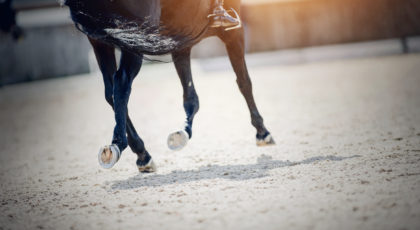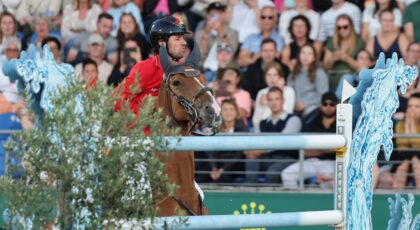When I meet someone new, I often don’t introduce myself as a horse person—and it is probably not for the reasons you think.
Ok, maybe I lied.
It is partly the reasons you think. I want to avoid the dirty jokes, the references to cowboys or racehorses, and the awkward conversation around the phrase “horses are expensive.”
Still, the main reason I do not readily disclose my “horse girl” status is that I am not always up to explaining what my life with horses entails exactly.
How do I explain what I do in a lesson? Or how much time I spend thinking about what to feed my mare or what the outdoor ring footing might be like on a spring day? How do I translate all of this to someone whose only context is the steed they saw on the latest episode of Bridgerton?
Granted, I am an essayist who writes primarily about horses; it is my job to translate precisely these types of things for the masses. Equestrians as a rule, however, are not under the same obligation.
So if, you are not a horse person and and someone you know discloses that they are, for a fact, “into horses,” take it as an compliment—you seemed like a safeplace to share something incredibly close to their heart. Then, may I gently suggest, the following guidelines:
First, and for most, accept that you are likely to be dangerously lacking in any relevant information. I have ridden most of my life. Recently I made a quick list and realized that I have ridden over 20 breeds in a handful of disciplines. Even still, I start with the assumption that I am ignorant. Also, more likely than not they don’t want to hear about “the one time you rode a horse.” Sorry. The upside: most people will give you the world on a string if you are kind, curious about their passion, and leave your judgment in your other pants.
“What discipline do you like?” is always a safe opening. The question establishes that you understand that the horse world is absurdly diverse. I can think of 30 different activities people use horses for off the top of my head, and I am sure that there are many I am missing.
For instance, a classical dressage trainer will have a different set of experiences than someone who competes in fine driving. A sidesaddle rider who performs in Escaramuza charra will know things that a polo player does not and vice versa. Someone who trailers their horse to a group ride with food and live bands in the southern United States will have an alternate definition of a “trail ride” than those packing and outfitting in the Alaska wilderness. And lastly, many people own horses as pets. They feed and look after them for the simple joy of doing it.
Which brings us to our next point: assume nothing. If you thought the number of disciplines in equestrian is ridiculous, there are over 200 different horse breeds currently roaming the planet. So just as you wouldn’t assume a dog is a pug or a pitbull until you get more information, the same care should be taken with horses. A 2,000-pound strawberry Roan Brabant is a world away from a tiny spotted Falabellas from Argentina, even if they are the same species. If your acquaintance says they “have a horse,” you never know what you will get.
Each breed also has its own show circuit, culture and drama, too. I have made my fair share of cultural faux pas, and I will be the first to tell you that it is often best to let the person you are talking to be your guide.
Lastly, while the drama and danger of horse life are exciting, it’s the mundane aspects of horse life that are sources of endless intrigue and analysis for horse people. Recently, a friend and I had a long adoring conversation about proper dry lot drainage, complete with before and after pictures. I am pretty sure anyone overhearing us was either bored into a coma or thought we were veering toward insanity.
Still, for those on Team Equus, these animals are what make life worth living—and if you take a little care and listen close, you will have a friend for life.


 May 4, 2022
May 4, 2022 

























